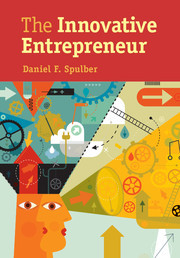Description
The Innovative Entrepreneur
Author: Spulber Daniel F.
This book presents an economic framework that addresses the motivation of the innovative entrepreneur.
Language: English
Subject for The Innovative Entrepreneur:
Approximative price 45.81 €
In Print (Delivery period: 14 days).
Add to cart
The Innovative Entrepreneur
Publication date: 06-2014
380 p. · 17.7x25.2 cm · Paperback
Publication date: 06-2014
380 p. · 17.7x25.2 cm · Paperback
Approximative price 96.93 €
In Print (Delivery period: 14 days).
Add to cart
The Innovative Entrepreneur
Publication date: 06-2014
380 p. · 18.2x26 cm · Hardback
Publication date: 06-2014
380 p. · 18.2x26 cm · Hardback
Description
/li>Contents
/li>Biography
/li>
Innovative entrepreneurs are the prime movers of the economy. The innovative entrepreneur helps to overcome two types of institutional friction. First, existing firms may not innovate efficiently due to incumbent inertia resulting from adjustment costs, diversification costs, the replacement effect, and imperfect adjustment of expectations. The innovative entrepreneur compensates for incumbent inertia by embodying innovations in new firms that compete with incumbents. Second, markets for inventions may not operate efficiently due to transaction costs, imperfect intellectual property protections, costs of transferring tacit knowledge, and imperfect information about discoveries. The innovative entrepreneur addresses inefficiencies in markets for inventions through own-use of discoveries and adoption of innovative ideas. The Innovative Entrepreneur presents an economic framework that addresses the motivation of the innovative entrepreneur, the innovative advantage of entrepreneurs versus incumbent firms, the effects of competitive pressures on incentives to innovate, the consequences of creative destruction, and the contributions of the innovative entrepreneur to the wealth of nations.
1. Introduction; 2. Entrepreneurial motivation: maximizing life-cycle utility; 3. Innovative advantage: entrepreneurial initiative and incumbent inertia; 4. Competitive pressures and entrepreneurial incentives to innovate; 5. Creative destruction: transaction costs and intellectual property rights; 6. Creative destruction: making new combinations; 7. Creative destruction: tacit knowledge; 8. Creative destruction: asymmetric information; 9. The wealth of nations: international trade and investment; 10. Conclusion.
Daniel F. Spulber is the Elinor Hobbs Distinguished Professor of International Business and Professor of Management Strategy at the Kellogg School of Management, Northwestern University, where he has taught since 1990. He is also Professor of Law at the Northwestern University Law School (Courtesy). Professor Spulber is the Research Director for the Searle Center on Law, Regulation and Economic Growth. He served as the founding director of Kellogg's International Business and Markets Program. He is also the author of numerous books, including The Theory of the Firm: Microeconomics with Endogenous Entrepreneurs, Firms, Markets, and Organizations (Cambridge University Press, 2009); Economics and Management of Competitive Strategy (2009); Networks in Telecommunications: Economics and Law (with Christopher Yoo, Cambridge University Press, 2009); and Global Competitive Strategy (Cambridge University Press, 2007). He received his PhD in economics from Northwestern University.
© 2024 LAVOISIER S.A.S.




